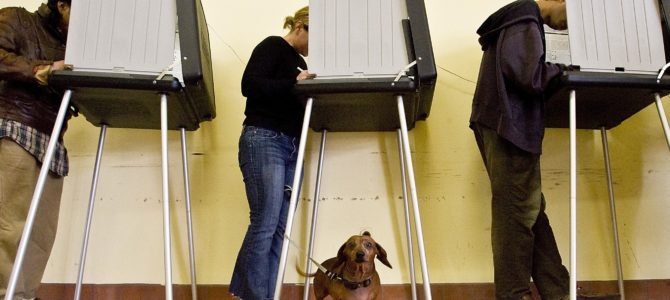
American voters believe lots of ridiculous things. We know this from polling. We also know that voters can see through preposterous hypotheticals and transparently partisan questions and answer accordingly.
For example, the big jaw-dropping news today is a poll featured in The Washington Post which found that slightly more than half of Republicans claim they would support postponing the 2020 presidential election if President Donald Trump proposed it to ensure only citizens could vote.
This result allowed the Joe Scarboroughs of the world to do rigorous hand-wringing about the dawn of fascism, the cult of Trump, and The End of Days. The truth, though, is more complicated.
“Critics of President Trump,” says The Washington Post, “have repeatedly warned of his potential to undermine American democracy.” Oh, have they?
The survey then attempts to buttress the critics’ case by creating a hypothetical situation—and I mean “hypothetical” in the way that dragons existing is hypothetical—because they know they can tease out the exact answer they desire:
If Donald Trump were to say that the 2020 presidential election should be postponed until the country can make sure that only eligible American citizens can vote, would you support or oppose postponing the election?
What if both Donald Trump and Republicans in Congress were to say that the 2020 presidential election should be postponed until the country can make sure that only eligible American citizens can vote? Would you support or oppose postponing the election?
The results of this poll are indeed disturbing, but not in any way unique or any way illuminating or in any way relegated to one party. It’s probable, in fact, that many of those polled are reacting instinctively to their belief that illegal immigrants are voting in large numbers. Others, no doubt, intuitively understand this is an anti-Trump question and offer what they believe is the correct answer.
“At a minimum,” write the authors, the poll illustrates “that a substantial number of Republicans are amenable to violations of democratic norms that are more flagrant than what is typically proposed (or studied).” Really? The piece offers no evidence to back up this assertion.
Now, doubtlessly, some Republicans would eagerly postpone an election if they believed it was being conducted unfairly. As is often pointed out, a group of conservatives (falsely) believe that illegal immigrants are voting in large numbers. (They, no doubt, see this as violation of “democratic norms.”) What is less often pointed out is that a large number of Democrats also believe Russians tampered with voting totals in 2016. Both sides stoke these conspiracy theories and voters’ fears to enrage and activate their bases.
But if the pollsters in The Washington Post wanted to better understand how prone American voters are to dispensing with democratic norms, they could have just as easily found out. They could written that “critics of Democrats have also repeatedly warned that liberals are trying to undermine democracy by overturning an election that was won fairly” and then, for context, asked an additional question:
If Barack Obama and Democratic Party leadership claimed that the 2016 presidential election was illegitimate because the Russians may have altered vote totals in some states, would you support or oppose redoing the election?
Would we likely see similar numbers of Democrats willing to ignore the process and throw norms way? I’d say it’s probable. After all, in June of 2016, a poll found that 67 percent of Democrats would be okay with cancelling the 2016 presidential election if it meant President Obama could serve another term. These Democrats weren’t even offered any speculative or distressing situation that might rationalize or justify shelving an election. Well, nothing other than a deep admiration for Obama. I also imagine—or hope—that most of those polled were simply offering an emotional response, just as Republicans were to the Trump question.
None of this is to say we don’t have a problem. It is true that Trump has a cult-like following. Obama had a cult-like following, as well. Those only suddenly horrified or okay with this trend are either hypocrites or frauds. The more important you make politics, and the bigger government gets, the more likely we are to see more of it.
The problem here, though, is that any scientific credence that polling lends to political debate is undermined when pollsters offer absurd hypotheticals that skew questions to establish the preconceived notions of one side. Neither the courts nor Republicans nor the dispersed state electoral system—one that so many on the Left want to centralize—would ever acquiesce to a postponement of the presidential election. Nor has Trump ever proposed doing anything of the sort. Polling can often offer us useful information about what Americans are thinking. Entertaining the imagination of the fever swamp is a waste of time.








